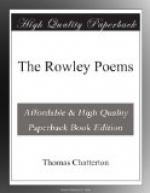which last he appears in an unguarded moment to have
acknowledged to his mother). He told her also
that he had himself written one of the two poems
Onn
oure Ladies Chyrche—which one, Mrs.
Chatterton could not remember[4], but if it was the
first of the two printed in this edition (p. 275)
it was a strange coincidence indeed that led him to
repudiate the antiquity of the only two Rowley poems
which are really at all like ’antiques’—Professor
Skeat’s convenient expression. The two
Battles of Hastings were written during this period,
and it appears that Barrett the surgeon, on being shown
the first poem, was for once very insistent in asking
for the original, whereupon Chatterton in a momentary
panic confessed he had written the verses for a friend;
but he had at home, he said, the copy of what was
really the translation of Turgot’s Epic—Turgot
was a Saxon monk of the tenth century—by
Rowley the secular priest of the fifteenth. This
was the second
Battle of Hastings as printed
in this book. Again this strange explanation,
so laboured and so patently disingenuous, was accepted
without comment though probably not believed.
And if it appears matter for surprise that there should
ever have been any controversy about the authorship
of the Rowley writings, in view of the lad’s
admission that he had written three such signal pieces
as the
Bristowe Tragedy, the first
Battle
of Hastings, and
Onn oure Ladies Chyrche,
it must be considered that the production of the greater
part of the poems by a poorly educated boy not turned
seventeen would naturally appear a circumstance more
surprising than that such a boy should tell a lie
and claim some of them as his own.
With his acknowledged work, as with Rowley, Chatterton
by dint of continued application was making good progress.
In 1769 he had become a frequent contributor to the
Town and Country Magazine, to which he sent
articles on heraldry, imitations of Ossian (whom he
very much admired) and various other papers; and in
December of this year he wrote to Dodsley, the well-known
publisher, acquainting him that he could ’procure
copies of several ancient poems and an interlude,
perhaps the oldest dramatic piece extant, wrote by
one Rowley, a Priest in Bristol, who lived in the
reign of Henry the Sixth and Edward the Fourth * *
* If these pieces would be of any service to Mr. Dodsley
copies should be sent.’ The publisher returned
no answer. Chatterton waited two months, then
wrote again and enclosed a specimen passage from AElla.
He could procure a copy of this work, he wrote, upon
payment of a guinea to the present owner of the MS.
Again Mr. Dodsley lay low and said nothing, and so
the incident closed.




